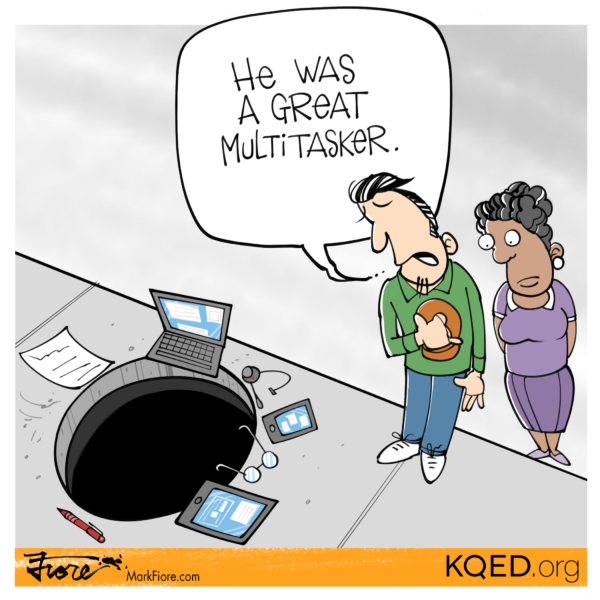Luckily, there are some practical strategies to break nomophobia and increase health and well-being. UCSF neuroscientist Dr. Adam Gazzeley and California State University, Dominguez Hills professor emeritus Larry D. Rosen offer tips in their new book, "The Distracted Mind: Ancient Brains in a High Tech World." We've categorized them into three areas.
Socializing
Even though social media allows us to collect thousands of digital friends, our physical relationships are taking a hit. Research shows that digital devices are impacting closeness and connection with loved ones. One study found a correlation between the mere presence of a phone at the dinner table and a diminished sense of trust and empathy between individuals.
Tips
- Declare places like the dining room to be technology-free zones.
- When engaging in an important conversation, set a timer for a predetermined period during which you and the person you're talking to will refrain from checking your phones.
- If you’re worried about missing urgent calls, then use an app like Essential Calls or Selective Silence for Android devices, or Do Not Disturb coupled with the Allow Calls function on an iPhone.
Sleep
I used to think it was relaxing to scroll through my email or Facebook feed one last time before shutting my eyes at night, but screen time messes with your sleep. The blue light emitted by a smartphone or tablet affects melatonin, a hormone that controls the natural sleep-wake cycle. Mounting evidence has found that--unlike reading a book--online browsing stimulates the brain.
Tips
- Remove your digital devices from the bedroom.
- If that sounds impossible, a Mayo clinic study advises dimming devices and holding the screen at least 14 inches away from your face to reduce the blue light infiltrating your eyes, so as not to inhibit the release of melatonin.
Safe Driving
At 55 mph, taking your eyes off the road for five seconds to respond to a text message is the equivalent of driving 100 yards -- the length of a football field--with your eyes closed. Hand-free devices, you should consider, are not the solution; A recent study revealed that drivers can remain distracted for up to 27 seconds after hanging up a call, even if it was enabled by a voice assistant.
The U.S. Department of Transportation reports that in 2013 distracted driving claimed 3,154 lives and injured an estimated 424,000 Americans, all of which were 100 percent preventable.
Tips
- Leave your phone in your trunk with the Bluetooth off.
- If that’s too much to bear, give your device to a passenger to monitor.
- Apps can help. SafeDrive gives you points when you restrict yourself from your phone while you're driving faster than 6 mph. You can use the points to receive discounts at participating stores. DriveMode reads incoming messages by turning texts into audio. Parents can check out Cellcontrol, DriveMode and Live2Txt for teens behind the wheel.
Gazzeley says none of this is about opting out of technology. Rather, the point is to create boundaries and carve out time to focus on a single task. This means we will all have to stop responding every time our phone rings, dings or otherwise beckons.

